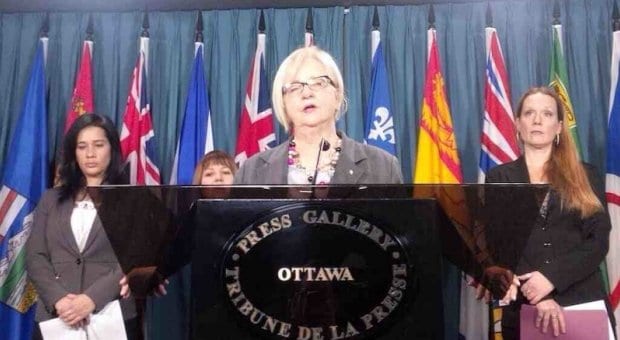Porn, you’ve got an enemy in Joy Smith.
The outspoken MP for Winnipeg’s Kildonan–St Paul riding, known as one of the more socially conservative members of the Harper government, earned her stripes as a moral campaigner in an early-morning press conference Nov 20 on Parliament Hill.
Smith was joined by Gail Dines, a self-described anti-porn activist who infamously launched a lawsuit against BDSM website kink.com, arguing that it violated the United Nations Convention Against Torture.
Together they made the case that pornography is “grooming” the youth of Canada — leading to sexual abuse, child exploitation and human trafficking.
“We need to connect the dots,” Smith said.
“In this massive fight against child exploitation, human trafficking and the sexualization of our children, porn is the mass groomer and driver of demand.”
The two are campaigning to get the federal government to implement a factory-default firewall that would block any form of adult material, unless the credit-card holder for the internet service disables it.
While the two didn’t propose much in terms of policy, the filter aside, they did call on the country to have a serious conversation about limiting and regulating pornography.
Throughout the press conference, Smith and Dines linked pornography to human trafficking. When Xtra asked how she came to that connection, Smith explained that “the objective of a trafficker is to make a heck of a lot of money.
“The porn industry is much more lucrative, let’s put it that way. So it really goes together. Once a victim is groomed, they seem to think this is normal, that there’s nothing wrong with it. Unfortunately, they end up being sick, harmed, they die. There’s very bad things that happen to them. They don’t hear about that when it first starts.”
Xtra also asked Dines — who holds a PhD in sociology from the University of Salford and now teaches at a private college in the United States — whether there is peer-reviewed evidence of the link between pornography and trafficking. She admitted that, no, such evidence does not exist.
Nevertheless, Dines and Smith remain convinced porn is bad for the brain.
“Free porn is the equivalent of me standing outside a school and giving out cigarettes and alcohol,” Dines said.
In a statement, they do cite a handful of studies showing that children are being exposed to pornography at ever-younger ages. According to “recent research” and “a 2009 report,” there is a further correlation between early viewing of pornography and sexual harassment.
There’s no shortage of research claiming to measure the impacts of pornography. One University of Hawaii study analyzed dozens of surveys and studies into the effects of pornography. The conclusion? The idea that porn somehow leads to any form of sexual abuse is “a myth.” If there is any relationship, it says, porn probably reduces instances of sex crimes.
But Smith is committed to doing something about porn. In July, she told Xtra that she would like to see a great Canadian porn filter — a national mandatory firewall, akin to what is being attempted in England.
When asked if such a filter could present a danger to freedom of speech by censoring non-pornographic websites, either inadvertently or intentionally, Smith called that a “bogus argument.”
But that’s exactly what happened when Australia tried a similar initiative. It happened on a smaller scale in Canada, when a well-intentioned family-friendly filter on the free WiFi at Tim Hortons blocked Daily Xtra.
While Smith and Dines did most of the talking, they were also joined by Julia Beazley, a policy analyst at the Evangelical Fellowship of Canada, who said that from her studies, “it became clear to me that trafficking, prostitution, strip clubs and pornography are all interconnected.”
Also present was Casandra Diamond, with the Women’s Support Network of York Region. She says that she suffered abuse at the hands of a family member and that pornography was a key motivator for his actions. She called it an “addiction.”
When asked whether it would be more effective to improve sexual education in schools, Smith backed away. She underlined that education is a provincial issue and that parents should be primarily responsible for educating children. She says that schools should have some role but that parents should sign off on any sex education in schools.


 Why you can trust Xtra
Why you can trust Xtra


